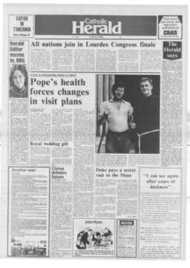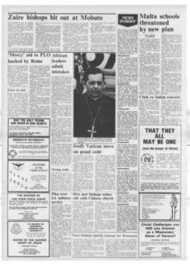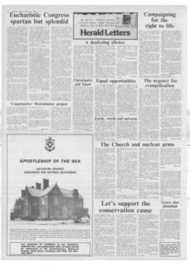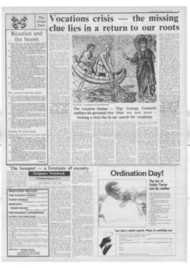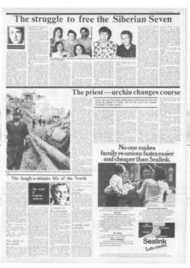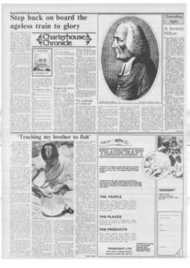Page 7, 31st July 1981
Page 7

Report an error
Noticed an error on this page?If you've noticed an error in this article please click here to report it.
Tags
Share
Related articles
Mps Step Up Campaign To Aid Religious Refugees In Moscow
Seven Siberian Pentecostals, Who Have Been Living In The...
Hunger Strike
News In Brief
Russia Admits Swing To Christianity
The struggle to free the Siberian Seven
A LITTLE over three years ago, two Siberian families, the Chmykhalovs and the Vashchenkos, went to the American embassy in Moscow to discuss their emigration case. They had travelled for two days by train from their home town of Chernogorsk in Southern Siberia to accomplish one task. to leave the country that prohibited them from practising what they so dearly believed in.
They arrived at the American Embassy in Moscow with high hopes and anticipation, for they had been trying for 18 years to emigrate without success. Since the early 1960's. under Nikita Krushchev, there had been a tremendous crackdown on the regulation of religious beliefs. The Soviets pledged to wipe out Christianity in the Soviet Union and the method by which this was to be done was a combination of harassment and threats.
For many, the imposed strength of the government upon them forced them away from Christianity. They still believed in their hearts but could not practise due to the government-imposed restrictions on preaching and religious meetings.
The government could regulate who preached. what they preached and for how long. Also any religious visitors had to report to the Soviet authorities or be faced with arrest and it was forbidden to take children to church before they were 18 years old. It was a crime to raise your child as A Christian.
The plight of the Siberian families began on June 27, 1978. The US officials in Moscow had heard of their persecution and had written to invite them to NI osc ow After a long journey. they arrived at the embassy and Peter Vashchenko, the leader of the group, approached the Soviet militiaman standing guard at the eatewav to the Embassy with the teller that he had received from the American authorities. After reading this letter. the guard informed Vashchenko that ssithout a document from the Soviet government, a Soviet citizen could not enter a foreign embassy: the letter of invitation from the US officials was not enough to be allowed into the embassy. They were told to leave the gateway of the embassy.
However. in anticipation of such problems the Seven had decided in advance what action to take. They rushedpast the guard into the safety of diplomatic territory.. In their rush, the guard grabbed John, the young sun of Peter and Augustina Vashchenko, and dragged him to the ground. From the safety of the embassy grounds. the two families were only able to watch as a grey-clad figure knelt on John's chest, almost smothering
the life out of him.
Since that time the Seven have been "prisoners of conscience", confined in the basement of the American Embassy. They have been in a room about 20' x 20'. the size of an average bedroom. In this room they eat. sleep and bath. They have one window which faces out onto the street which is mere grating and no glass.
A KGB agent is constantly monitoring their activities. At the beginning of their confinement a KGB agent rapped a night stick acriis the grating in the middle of
the night so as not to permit the hostages any sleep. This was finally stopped on the insistence of the embassy staff. Because there is no glass in the window, when street washers come by, eater often sprays in and soaks their belongings. Now whenever they hear the low moan of a truck coming down the street. there is a mad dash to move everything as far away from the window as possible. The Seven are allowed exercise in the embassy yard for approximately 30 minutes a day. Until about a year ago their exercise sessions were even less frequent and for even shorter periods.
It all may sound ridiculous but the absurdity of the situation is not going unnoticed. Worldwide groups have got involved in the campaign to free the "Siberian Seven". In Britain efforts are being coordinated by Buzz Magazine. When they heard about the Seven they organised a committee to organise support for their release. They have organised rallies, like the very successful one in Trafalgar Square on the third anniversan
of the confinement on June 21, 1981. and a visit to meet the Seven by committee staff.
Danny Smith, the organising secretary of the Committee to Free the Siberian Seven, met them in early July. When he returned he had great impressions which he shared with newsmen: "I had to change my opinion about them. They were much more sophisiticated than I had imagined. Lyuba, the 28 year old daughter of the Vashchenko family. could easily become a
i
lawyer and argue their case in any court of law-.
Mr Smith also said that they spoke almost faultless English and that their minds were alive and bright and active. Despite their ordeal they were in good heart. Their biggest enemy was loneliness: Peter and Augustina Vashchenko have not seen their 10 other children for over three years, nor has Maria Chmykhalov seen her first two grandchildren born during the time of their confinement.
In Parliament I have tabled an Early Day Motion urging the Government to support the Seven: "That this House notes that 27th June 1981 is the third anniversary of the confinement of seven Siberian Christians in the basement of the United States embassy in Moscow following restrictions and oppression by the Soviet authorities: therefore urges Her Maiest's Government to
continue to press for an end to violations of the Universal Declaration of Human Rights (1948), the International Pact of Civil and Political Rights (1973) and the Helsinki Final Act (1975) by the Soviet authorities: reiterates its belief that all men and women should be free to worship without restriction: and therefore supports the group of Christians who are registering their protest at the Russian embassy on the occasion of 'this anniversary".
At the time of writing, 106 Members of Parliament had signed it.
What the Seven need now is support — moral and political. You couldwrite with an encouraging word to Wayne Merry. US embassy, Ulitsa Chaikovskovo 19, Moscow 117234, USSR. You could also ur local MP urging that
write yo
they sign the Early Day Motion 476.
There is great support for this cause. I understand that Buzz Magazine receives 30 letters a day from concerned Christians and that an appeal has been maw to Pope John Paul to intervene on behalf of the Seven. But time could be running out. Next year the US embassy will be leaving their existing premises. The fate of the Seven is then uncertain: a forced labour camp in Siberia or, perhaps. with enough public support. an exit visa to the West.
blog comments powered by Disqus


